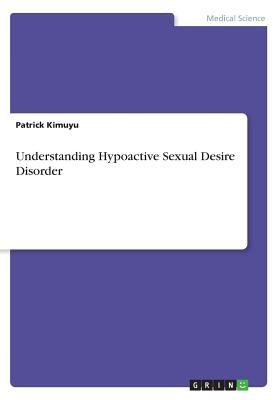
- We will send in 10–14 business days.
- Author: Patrick Kimuyu
- Publisher: GRIN Verlag
- Year: 2018
- Pages: 20
- ISBN-10: 3668638403
- ISBN-13: 9783668638402
- Format: 17.8 x 25.4 x 0.1 cm, minkšti viršeliai
- Language: English
- SAVE -10% with code: EXTRA
Reviews
Description
Document from the year 2018 in the subject Medicine - Gynecology, Andrology, grade: 1, Egerton University, language: English, abstract: In retrospect, sexual disorders have a significant impact on an individual's quality of life. It is also apparent that these disorders bear immense significance to the clinical practice. Despite their impact, most physicians do not seem to be interested to engage in extensive discussion with patients regarding sexual desire problems. This phenomenon is, probably, attributable to several reasons including time constraints, lack of efficient therapeutic interventions and insufficient knowledge. One of the most debilitating sexual desire disorders is hypoactive sexual desire disorder. HSDD is also known as inhibited sexual desire. HSDD is characterized by decreased or absence of desire for sexual activity and sexual fantasies which causes interpersonal difficulties, as well as personal distress. In some circumstances, the diagnosis of HSDD exhibits co-morbidity to an underlying sexual dysfunction. However, this disorder is not exclusively attributed to the effects of any substance, pathology or another psychiatric disorder. Even though some clinical experts have hypothesized the causes of HSDD to be associated with biological imbalances, the pathophysiology of this disorder remains unknown. As such, efforts to develop a comprehensive treatment and management strategies have not achieved remarkable success. Therefore, this literature review aims at providing an overview of HSDD.
EXTRA 10 % discount with code: EXTRA
The promotion ends in 22d.19:18:37
The discount code is valid when purchasing from 10 €. Discounts do not stack.
- Author: Patrick Kimuyu
- Publisher: GRIN Verlag
- Year: 2018
- Pages: 20
- ISBN-10: 3668638403
- ISBN-13: 9783668638402
- Format: 17.8 x 25.4 x 0.1 cm, minkšti viršeliai
- Language: English English
Document from the year 2018 in the subject Medicine - Gynecology, Andrology, grade: 1, Egerton University, language: English, abstract: In retrospect, sexual disorders have a significant impact on an individual's quality of life. It is also apparent that these disorders bear immense significance to the clinical practice. Despite their impact, most physicians do not seem to be interested to engage in extensive discussion with patients regarding sexual desire problems. This phenomenon is, probably, attributable to several reasons including time constraints, lack of efficient therapeutic interventions and insufficient knowledge. One of the most debilitating sexual desire disorders is hypoactive sexual desire disorder. HSDD is also known as inhibited sexual desire. HSDD is characterized by decreased or absence of desire for sexual activity and sexual fantasies which causes interpersonal difficulties, as well as personal distress. In some circumstances, the diagnosis of HSDD exhibits co-morbidity to an underlying sexual dysfunction. However, this disorder is not exclusively attributed to the effects of any substance, pathology or another psychiatric disorder. Even though some clinical experts have hypothesized the causes of HSDD to be associated with biological imbalances, the pathophysiology of this disorder remains unknown. As such, efforts to develop a comprehensive treatment and management strategies have not achieved remarkable success. Therefore, this literature review aims at providing an overview of HSDD.


Reviews